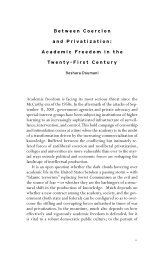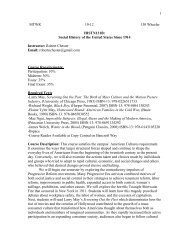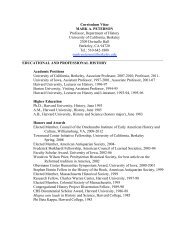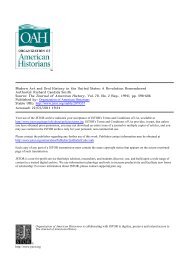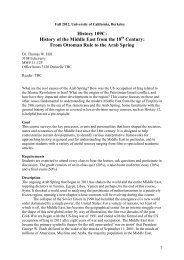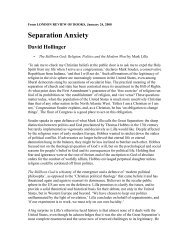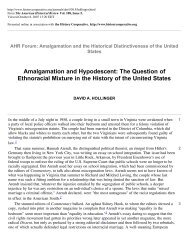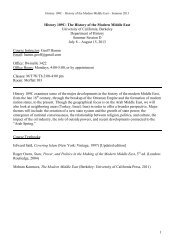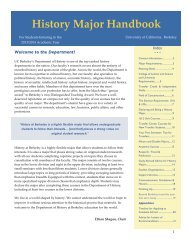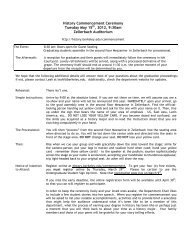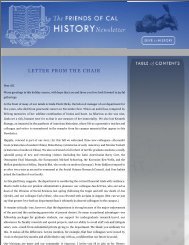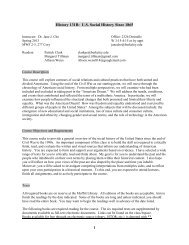My Grandmother and Other Stories: Histories of the Palestinians as ...
My Grandmother and Other Stories: Histories of the Palestinians as ...
My Grandmother and Other Stories: Histories of the Palestinians as ...
Create successful ePaper yourself
Turn your PDF publications into a flip-book with our unique Google optimized e-Paper software.
orange. The Hijaz rose in revolt, but Syria w<strong>as</strong> quiet”. 66 He also defends <strong>the</strong> m<strong>as</strong>sive<br />
deportations <strong>of</strong> <strong>the</strong> civilian population from co<strong>as</strong>tal Palestine, especially from Jaffa,<br />
after <strong>the</strong> British fleet established <strong>the</strong>ir blockade. In his memoirs, <strong>the</strong> Jewish population<br />
in particular had to be prevented from sending intelligence to <strong>the</strong> Allies about Ottoman<br />
troops. 67<br />
Rifki makes insightful observations about <strong>the</strong> integration <strong>of</strong> Turkish <strong>and</strong> Arab ethnicity<br />
<strong>as</strong> components <strong>of</strong> Ottoman society. “The Ottoman Sultanate is solidly bureaucratic”,<br />
he states, “but <strong>the</strong> bureaucracy here [in Palestine] is half Arab. I have not seen a single<br />
Turkicized Arab, <strong>and</strong> I have seen precious few Turks who were not Arabized… We<br />
have nei<strong>the</strong>r colonized this region nor made it part <strong>of</strong> our l<strong>and</strong>. The Ottoman Empire<br />
here is <strong>the</strong> unpaid watchman <strong>of</strong> <strong>the</strong> fields <strong>and</strong> streets.” 68 When <strong>the</strong> author moves on to<br />
discuss <strong>the</strong> situation in Jerusalem, this point <strong>of</strong> <strong>the</strong> <strong>as</strong>similating, but non-<strong>as</strong>similated,<br />
Arab becomes a source <strong>of</strong> protest against <strong>the</strong> Turkish predicament outside Anatolia.<br />
“We are lodgers in Jerusalem”, Rifki remarks sardonically, in a manner reminiscent<br />
<strong>of</strong> Russian protestations <strong>of</strong> being a marginalized group in Soviet Moscow. “As all<br />
minorities in <strong>the</strong> Ottoman Empire had privileges, while <strong>the</strong> Turks had none, it w<strong>as</strong><br />
more advantageous to belong to any Muslim minority than to be a Turk.” 69 These<br />
remarks may sound ridiculous to an Arab historian looking back at that era, but <strong>the</strong>y<br />
actually reflected a serious perception <strong>of</strong> <strong>the</strong> ‘Arab problem’ within <strong>the</strong> thinking <strong>of</strong> an<br />
important contingent <strong>of</strong> <strong>the</strong> ruling Ottoman elite <strong>and</strong> certainly in <strong>the</strong> thinking <strong>of</strong> Jamal<br />
P<strong>as</strong>ha himself, who w<strong>as</strong> fighting a desperate struggle to salvage <strong>the</strong> Ottoman idea<br />
<strong>as</strong> secessionist groups gnawed at <strong>the</strong> peripheries <strong>of</strong> <strong>the</strong> Empire. The significance <strong>of</strong><br />
Arab integration, from <strong>the</strong>ir point <strong>of</strong> view, w<strong>as</strong> that Arabs were <strong>the</strong> l<strong>as</strong>t element <strong>of</strong> <strong>the</strong><br />
Sultanate (<strong>the</strong> Kurds probably did not count <strong>the</strong>n) that w<strong>as</strong> Muslim (in <strong>the</strong> main) <strong>and</strong> a<br />
potential ally against cooption by <strong>the</strong> Western powers. Hence, <strong>the</strong> disappointment w<strong>as</strong><br />
compounded by Arab ‘betrayal’. In <strong>the</strong> end, it w<strong>as</strong> <strong>the</strong> Arabs who deserted <strong>the</strong> Turks,<br />
<strong>and</strong> not <strong>the</strong> Turks–in <strong>the</strong>ir campaign <strong>of</strong> Turkification–who undermined <strong>the</strong> Ottoman<br />
idea. This perception is clear in Rifki’s analysis. “Don’t think <strong>the</strong>re w<strong>as</strong> an ‘Arab<br />
problem’ in that huge l<strong>and</strong> stretching from Aleppo to Aden,” he insisted, “…what <strong>the</strong>re<br />
w<strong>as</strong> anti-Turkish feeling. Take that away <strong>and</strong> <strong>the</strong> Arabs would have collapsed into<br />
disunity.” 70<br />
Rifki does not shed light on Jamal’s presumed strategy <strong>of</strong> building an Arab-Turkish<br />
federation to replace <strong>the</strong> disintegrating Ottoman regime, <strong>as</strong> suggested by some Arab<br />
thinkers, like Omar al-Salih. But it is clear from his memoirs that Jamal’s failure w<strong>as</strong><br />
a defeat for any future Turkish-Arab dominion. Rifki recounts <strong>the</strong> bitterness <strong>of</strong> his<br />
comm<strong>and</strong>er replaced in <strong>the</strong> supreme comm<strong>and</strong> by General von Falkenhayn:<br />
Jamal P<strong>as</strong>ha w<strong>as</strong> unwilling to give up his Syrian dream; he wanted to<br />
return to Istanbul at <strong>the</strong> end <strong>of</strong> <strong>the</strong> war bearing <strong>the</strong> gift <strong>of</strong> a Syria preserved.<br />
[ 50 ] HISTORICAL FEATURES The Short Life <strong>of</strong> Private Ihsan



